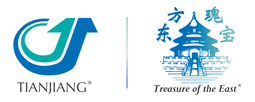6 Herbs for Allergy Season
The National Center for Health Statistics estimates that 81 million people in the U.S. are diagnosed with seasonal allergic rhinitis. Of these, approximately 67 million are adults and 14 million are children. Let’s explore the causes, symptoms and formulas typically suggested for this common condition.
What Causes Seasonal Allergies?
Seasonal allergies, commonly known as hay fever or allergic rhinitis, start with a trigger: an allergen from the environment. These allergens may come from grass, flowers, trees, or mold spores, depending on the season and geographic location.
When the immune system reacts to allergens, the body is stimulated to produce antibodies. The combination of allergens and antibodies together causes various symptoms, for example inflammation of the lining in the nose (known medically as "rhinitis").
What are the Symptoms of Seasonal Allergies?
Seasonal allergies are characterized by constant sneezing (especially in the morning), runny nose, eyes that may be itchy, watery, swollen and/or red, itchy throat, and itchy skin.

How Does Chinese Medicine View Seasonal Allergies?
With documentation of allergic rhinitis dating over 2,000 years, Traditional Chinese Medicine (TCM) views allergy symptoms primarily as a result of wind-heat invasion and weakened Wei Qi (defensive energy).
As in conventional medicine, TCM shares the view that those with a family history of seasonal allergies are prone to this condition.
What are My Options for Seasonal Allergies?
Over-the-counter (OTC) and prescription antihistamine medications are often the first choice for individuals looking for seasonal allergy relief. However, their efficacy tends to decrease as the usage of these medications increases. Some individuals may also experience side effects from these medications, including drowsiness, dry mouth, dry eyes, dizziness and headache.
Another option for relieving nasal congestion and other discomforts of seasonal allergies is Traditional Chinese Medicine (TCM). This approach typically involves the use of Chinese herbs and other therapies like acupuncture and self-care strategies.
Chinese herbs for seasonal allergies can provide immediate relief, while helping to regulate the immune system for ongoing, preventative allergic reactions. As we’ll discuss, many of these herbal formulas are safe, gentle and effective to use throughout allergy season.
What are the best Chinese herbs for seasonal allergies?
The best Chinese herbs for seasonal allergies are the following formulations: Hua Fen Fang, Cang Er Zi San, Xin Yi San, Bi Yan Wan, Bi Qiu Tang, and Yu Ping Fang San.
Let’s explore the safety and efficacy of these time-tested herbal formulas and their role in helping to regulate the immune system while alleviating seasonal allergies.
6 Chinese Herbal Formulas for Seasonal Allergies
The following herbal formulas for seasonal allergies belong to a category of herbs known as “Release the Exterior.” Exterior syndromes refer to environmental pathogens – allergens in this case – that break through the Wei Qi or defense system barrier.
In addition to herbs that release the exterior, other herbal ingredients are included in these formulas to help boost or regulate immunity, calm the body’s overreaction to allergens, and strengthen other body systems, for complete, whole body care.
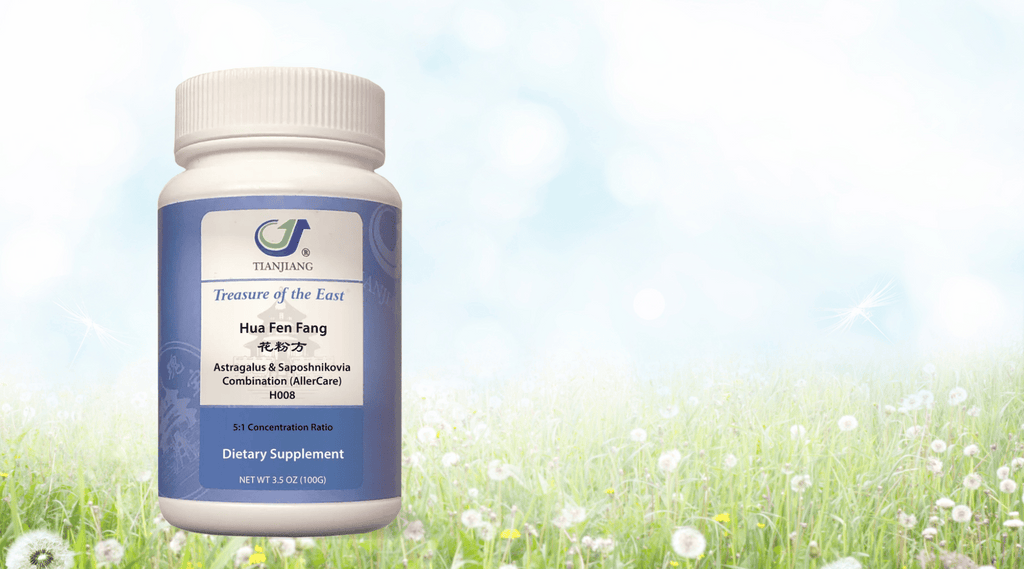
1. Hua Fen Fang (Astragalus & Saposhnikovia Combination)
Hua Fen Fang is a modern formula that is particularly beneficial when used at the onset of allergy season.
Individuals who routinely suffer from hay fever whenever spring arrives may benefit from Hua Fen Fang. This formula is intended for those with a TCM pattern that includes Wei Qi deficiency combined with one or more of the following – spleen Qi deficiency, lung Qi deficiency, and/or kidney Qi deficiency.
Consisting of nine herbs, Hua Fen Fang includes Bai Zhu to boost qi, fortify the Spleen, and stop sweating; and Fang Feng to release wind-cold and regulate the immune system.
2. Cang Er Zi San (Xanthium Formula)
Cang Er Zi San is a classical formula best known for its ability to clear the nasal passages.
Those suffering from profuse nasal discharge due to a TCM pattern known as Wind-Heat Attack may benefit from this formula. Other symptoms corresponding to Cang Er Zi San may include frontal headache, dizziness and nasal pain and obstruction. TCM practitioners will also see a floating, rapid pulse in these individuals.
Cang Er Zi (Xanthium Fruit), after which the formula is named, is an acrid, bitter and warm herb that disperses wind, opens the nose, and eliminates wind-dampness. Bai Zhi (Dahurian Angelica Root), Xin Yi (Magnolia Flower) and Bo He (Mint Herb) make up the remaining herbal ingredients of this simple yet powerful formula.
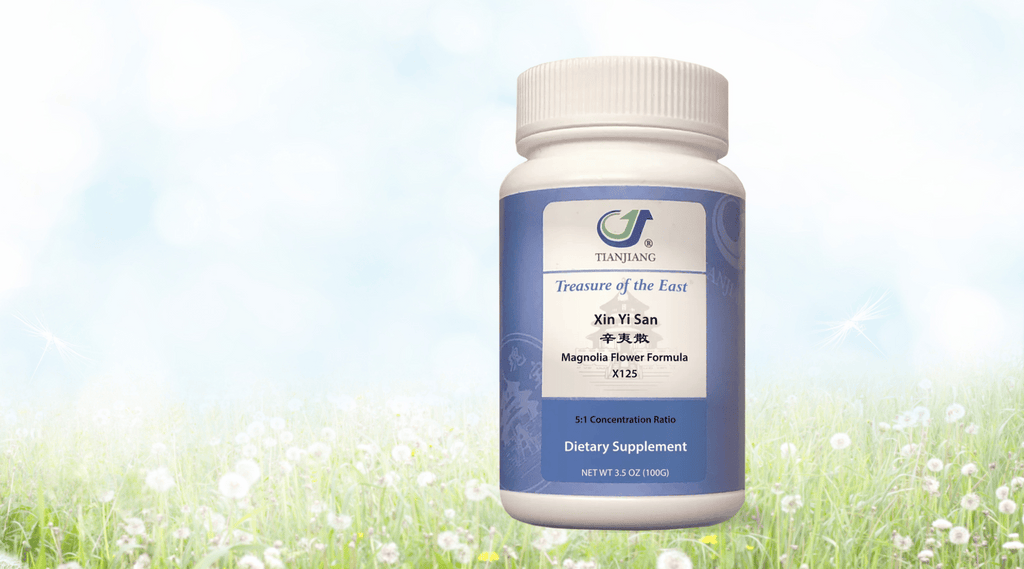
3. Xin Yi San (Magnolia Flower Formula)
Xin Yi San is another classical formula used for sinus congestion caused by a TCM pattern of Wind-Cold.
Xin Yi Hua (Magnolia Flower) is one of eight herbs in this formula: an acrid, warm herb that dispels wind and opens nasal passages. This herb is used in formulas for its purported ability to alleviate sinus congestion, sinus headaches and nasal discharge, and to improve diminished sense of smell.
Together with Gao Ben (Chinese Lovage Rhizome), Ze Xie (Alisma Rhizome), Qiang Huo (Notopterygium Rhizome and Root) and other herbal ingredients, Xin Yi San works to dispel wind, disperse cold, eliminate dampness, and stop painful obstruction in the sinuses.
4. Bi Yan Wan (Coix & Mentha Combination)
Bi Yan Wan is a modern formula developed in China’s TCM hospitals for patterns of Nasal Wind-Heat and Nasal obstruction caused by Damp-Heat.
This formula is particularly suitable for those with allergic rhinitis.
Bi Yan Wan is comprised of herbs that include Yi Yi Ren (Coix Seed), Bo He (Mint Herb) and Pu Gong Ying (Dandelion) to dry dampness and reduce nasal discharge; disperse wind-heat-toxins and control infections; and clear the head and eyes and unblock nasal passages.
5. Bi Qiu Tang (AllerCare)
Bi Qiu Tang, also known as Codonopsis & White Atractylodes Combination, or AllerCare, is a modern allergy formula. This formula differs from Hua Fen Fang in that it is appropriate for both onset of symptoms (acute phase) and maintenance (post-acute phase) during allergy season.
A formula with many functions, Bi Qiu Tang tonifies (with Dang Shen and Bai Zhu), releases the exterior (with Fang Feng), dries dampness and transforms phlegm (with Yi Yi Ren), vents rashes (with Chan Tui) and relieves itching (with Jing Jie).
Individuals prone to allergies who also exhibit underlying Qi deficiency – specifically TCM patterns of Wei Qi, Spleen Qi, Lung Qi and/or Kidney Qi deficiency – may especially benefit from this formula.
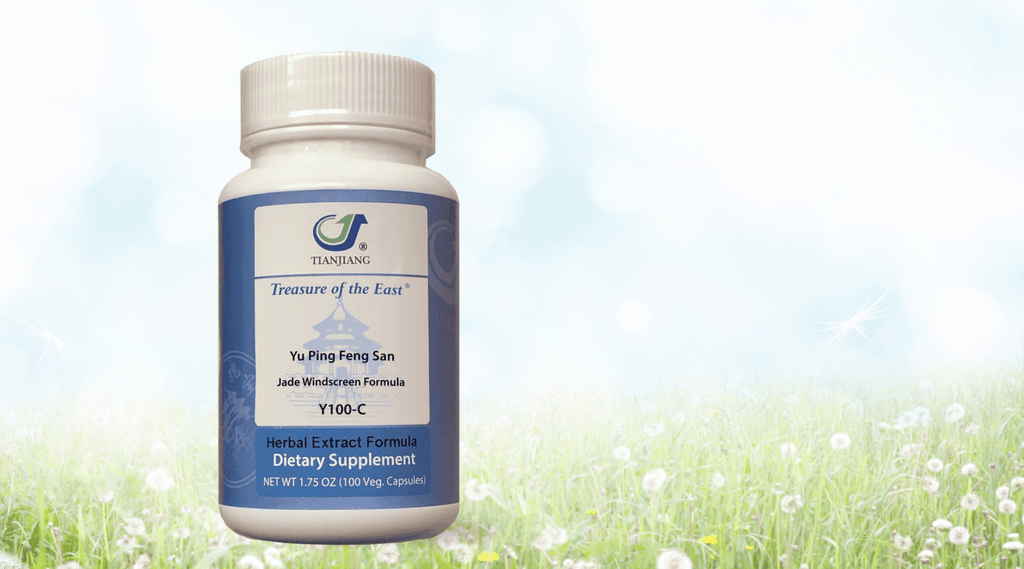
6. Yu Ping Fang San (Jade Windscreen Formula)
Yu Ping Feng San is a popular formula best known for its use during cold and flu season.
A preventative during cold and flu season, Yu Ping Feng San is also best used as a preventative strategy during allergy season, and/or as a maintenance formula once stronger symptoms have subsided.
Individuals who benefit most from this formula may have compromised immunity or a family history of seasonal allergies. In TCM, these patterns may include Qi deficiency, Wei Qi deficiency, vulnerability to external Wind pathogens, and spontaneous sweating due to Wei Qi deficiency.
Containing just three herbs – Huang Qi, Bai Zhu, and Fang Feng – Yu Ping Feng San has the unique function of balancing the immune system. Rather than boosting an allergic reaction, Yu Ping Feng San soothes and strengthens the immune system, thereby calming the body's reaction to allergens.
Allergy Season Self-Care Tips
Here are several self-care tips from a TCM perspective that may help manage and alleviate allergy symptoms.
Food As Medicine
TCM considers nutrition essential for maintaining a healthy Wei Qi. Some suggested foods for strengthening immunity are:
Yellow and Orange Vegetables: Carrots, pumpkins, and sweet potatoes are high in vitamin A which is believed to promote Wei Qi.
Dark Green, Leafy Vegetables: The deep pigments in green leafy vegetables, such as kale, contain a rich sources of carotenoids. Carotenoids are believed to inhibit the release of histamine – the precursor to allergy symptoms like itchy, watery eyes, runny nose and constant sneezing. Combined with olive oil or other good fats, dark leafy greens increase the body’s ability to absorb beneficial carotenoids.
Ginger: Used for thousands of years as a natural anti-inflammatory, ginger is another food that inhibits the release of histamine from certain cells.
Protein Sources: Foods like lamb, chicken, and turkey can support the immune system and promote Wei Qi.
Avoid Dairy: Because allergies often involve excess mucus production, TCM generally recommends avoiding dairy which can exacerbate mucus and phlegm.
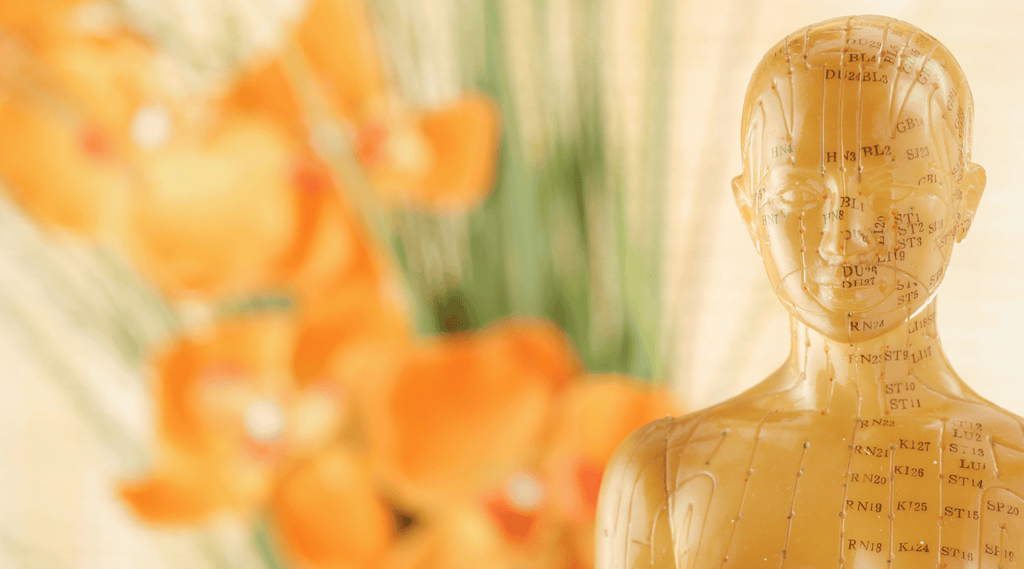
Acupuncture for Seasonal Allergies
Acupuncture, a key component of TCM, may alleviate sinus congestion, itching, and other allergic symptoms. It is believed to help modulate the immune system and may reduce inflammation related to allergic reactions.
Clinical data suggests that acupuncture can help regulate and maintain the balance of nervous, endocrine, and immune systems, enhance the body's immune function, and mitigate allergic reactions.
TCM practitioners are advised to first address seasonal allergies with acupuncture, and then address the root cause with Chinese herbal medicine. For particularly severe cases of hay fever, acupuncture sessions should occur once a week until allergy season is over.
Moxibustion for Allergic Rhinitis
Moxibustion is a traditional Chinese medicine therapy that involves burning dried plant materials, known as "moxa" (made from the plant mugwort), near or on the skin's surface. The heat generated aims to stimulate specific acupoints of the body to promote the circulation of vital energy through the meridians (or channels) and internal organs.
Studies suggest that indirect moxibustion may offer therapeutic benefits to those with allergic rhinitis.
Conclusion
We hope this article provides helpful information on Chinese herbs for seasonal allergies.
Because TCM offers a tailored approach for all conditions, including seasonal allergies, we always recommend consulting a qualified TCM practitioner for personalized advice to fit each individual’s needs.
Our wish is to empower TCM practitioners and their patients with premium-level Chinese herbs for improving health, safely and naturally.
Practitioners, did you know...? Treasure of the East’s full-spectrum extracts contain the same active chemical constituents as raw herbs! Register for a professional account today, or read on to discover all the benefits of including full-spectrum granules in your herbal pharmacy.
This article is provided only as an educational resource - it is not intended or implied to be a substitute for professional medical advice, and the herbs and/or formulas within are not intended to diagnose, treat, cure or prevent any diseases. This information is intended for only licensed healthcare practitioners.
